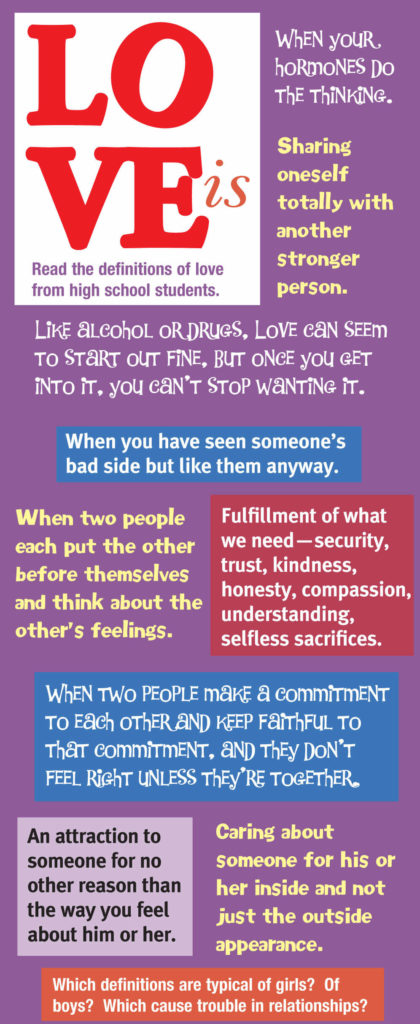by Connie Fourré

“You become what you do.”
An old saying, but it carries a lot of truth. You become a dancer by dancing. You become a guitarist by playing the guitar. You become a bully by choosing to take out your unhappiness on somebody weaker or less aggressive than you. You become a kind person by choosing to be kind to someone today, even if you don’t have the time or you don’t feel good.
So how do you become a happily married adult? Even though marriage is probably the last thing on your mind today, most teens hope to find someone to share their lives with — some day. And most would agree that sharing life in a loving, fun, basically peaceful way will have a big impact on longterm happiness. Most of us assume we’ll somehow get there, even though we know the divorce rate is over — what? — 50%.
50%. Think about it. 50% means, statistically speaking, half of the people sitting in the room with you at this moment will end up divorced. Look around and let that sink in for a minute. Nobody likes to think about that statistic. When we do think about it, we hope we’ll luck out and it won’t happen to us. We hope, without a lot of reflection, that if we just find the right person we’ll be okay.
Finding the right person is definitely important, but it’s only half of the equation. The other half is being the right person. A loving relationship takes two loving people. We become the right person by being a loving person, just as a person becomes a basketball player by playing basketball. We become a loving person by developing loving attitudes, skills, and habits. One can’t become a loving person just by thinking about it any more than one can become a long distance runner by thinking about it.
Which brings us to the subject of sex. Sex is part of a loving marriage relationship, a part most people wouldn’t be willing to live without. Sex is also an issue teenagers deal with, some better than others.
What’s the connection between dealing with sex in high school and sex in marriage? Loving attitudes, skills, and habits carry over. A bully on the playground stands a good chance of being a bully in a marriage. A casual attitude toward sex as a teenager or young adult increases the likelihood of infidelity in marriage — research backs up that statement. We become what we do.
What do people want out of marriage, and what do they hope to give? Most of us want someone who really knows us and likes us anyway. We want to feel free to be ourselves — not that we don’t need to change and grow, but that someone accepts and loves us just as we are. Another name for that is intimacy.
What comes to mind when someone says the word intimacy? Honestly?
For many people, intimacy is a polite term for sex. On TV, if a courtroom attorney asks the person on the stand, “Were you intimate with the defendant?” the attorney is really asking, “Have you had sex with the defendant?”
If asked to name another kind of intimacy besides sexual intimacy, some might come up with emotional intimacy — feeling close to another person. When people are looking for a romantic relationship, they often seek out some combination of sexual and emotional intimacy.
If we look at intimacy more broadly, as being known and accepted, as being truly connected to another person, different kinds of intimacy surface. Trying to keep a lifelong relationship going on just two kinds of intimacy is like trying to run an eight cylinder car on two cylinders. Possible, but rough. The more cylinders — or types of intimacy — we have going, the sturdier and happier our relationships will be.
A healthy, loving marriage requires several types of intimacy to thrive. High school relationships begin to form habits and attitudes that shape more serious relationships in the future. You spend many hours each week at school, which prepares you for an eventual job. Many teenagers spend many hours practicing to excel at a sport or other activity they care about. What practices today will help build the relationship you want in your future?
Humor
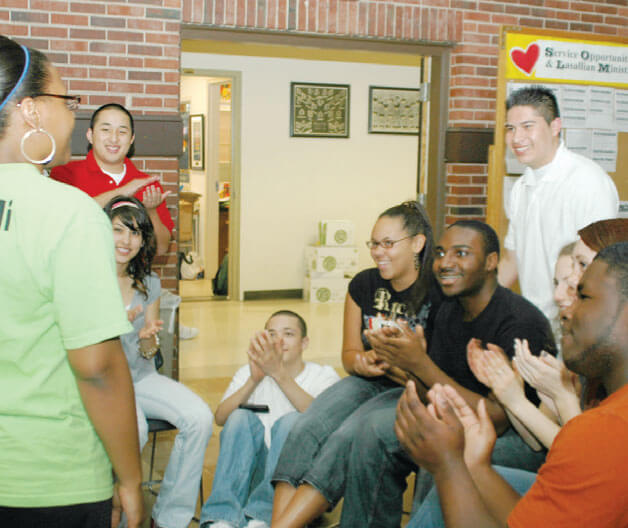
People connect through humor when they laugh at the same things. Have you ever been in a class and something strikes you and your best friend as funny but you know you’re not supposed to laugh? Or been in a room where everyone else thought something was funny and you didn’t? You’ve experienced the power of humor to connect and to exclude. Humor adds joy to life and helps make hard times bearable. Imagine being married to someone with no sense of humor.
Work
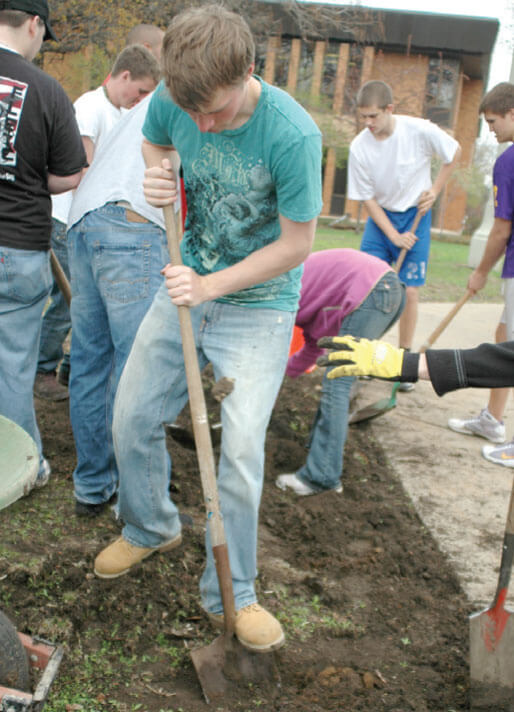
Think of a team where, win or lose, you knew everybody cared and were in it together. Farm families connect when they’re working hard to gather hay before a rain or get a field planted on time. Raising a family can be a type of work that connects — and it can be a big source of conflict in modern marriages.
Intellectual

Do you enjoy a good debate or discussion? Are you curious? Some people highly value a lively intellectual conversation with a friend or spouse.
Spiritual
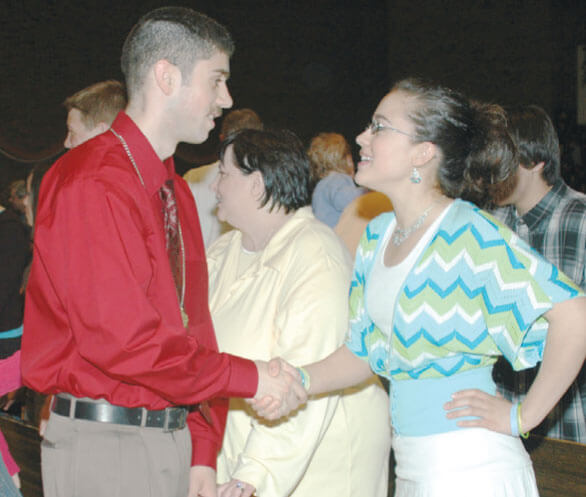
Have you ever been in a room with other people and just known God was there? Are there people you pray with? Being truly present to someone spiritually, which isn’t necessarily the same as agreeing with them, is a powerful form of intimacy.
Appreciation
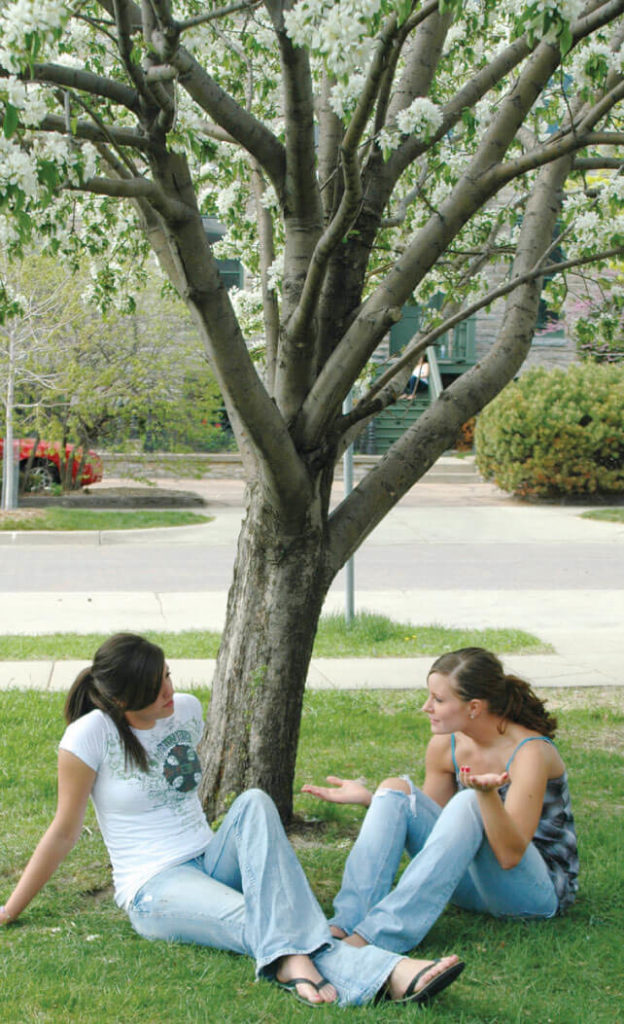
Ever seen a beautiful sunset and really wish you had someone to share it? Or a movie, or anything else you consider amazing to behold? What would it be like to live with someone who played music you hated really, really loud? Appreciating some of the same things connects people, sometimes without words.
Fun

What do you like to do for fun? Whether you like rollerblading, dancing, watching professional sports, or hanging out in coffee shops, relaxing and enjoying an activity together balances a relationship.
